 .. du site............
.. du site............
 Territoires (Black House,
Talisman 2)
paru en octobre 2001 aux
USA
Territoires (Black House,
Talisman 2)
paru en octobre 2001 aux
USA

 Territoires a
été publié chez Laffont le 18 octobre
2002.
Territoires a
été publié chez Laffont le 18 octobre
2002.
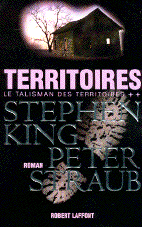 ma note
de lecture
ma note
de lecture
|
La quatrième de
couverture :
Il y a vingt ans, Jack a
survécu à l'enfer des Territoires.
Aujourd'hui, pour l'amour d'un enfant, il va franchir une
nouvelle fois la frontière.
French Landing, paisible
bourgade du Wisconsin, est terrorisée par un serial
killer. Désemparé, le shérif fait appel
à son ami Jack Sawyer, un ancien flic
d'Hollywood.
L'enquête conduit Jack
jusqu'à une maison que l'on dit hantée,
nichée au fond des bois. L'endroit réveille en
sa mémoire les échos d'un monde
parallèle qu'il lui semble avoir déjà
visité : il y a vingt ans, pour sauver sa
mère, Jack a pénétré la
contrée magique et terrifiante des Territoires.
Aujourd'hui, il a tout oublié. Et il a peur de son
passé.
Très vite,
d'étranges messages lui parviennent et les
réminiscences se font souvenirs. L'enquête de
police se change alors en quête fantastique.
Il ne s'agit plus de
démasquer un serial killer, mais d'arracher un enfant
des mains du souverain des Territoires, le Roi
écarlate. Pour Tyler, petit garçon aux cheveux
blonds, et Judy, la mère de celui-ci, Jack est
prêt à mourir - pire, à replonger dans
les Territoires.
- Stephen King n'a pas son pareil pour dresser un tableau
réaliste et terrifiant de l'Amérique
d'aujourd'hui, rehaussé par les irruptions d'un
fantastique ravageur. Ses grands romans, Carrie, Christine, Misery... ont été montés
à l'écran et font de lui un maître
moderne de l'horreur : chacun de ses livres est un
événement international.
- Peter Straub est également l'un des grands
romanciers du fantastique contemporain. Son Ghost
Story est l'un
des best-sellers incontestés du genre. Auteur de
quatorze romans, récompensé par de nombreux
prix littéraires, il a notamment fait
paraître
La
Gorge,
Le Club
de l'Enfer,
Monsieur
X et
Koko.
|

|
LA FANTASY
dans Le Talisman et
Les
Territoires.
LA
FANTASY DANS L'OEUVRE DE STEPHEN KING 
Stephen King est
réputé pour être un des
spécialistes du genre "Fantastique horrifique". Mais
il a aussi écrit des oeuvres de Fantasy, d'abord peu
nombreuses, mais qui se sont multipliées avec ses
expériences sur La Tour Sombre. Il semblerait
actuellement que la carrière du maître de
l'horreur s'achèvera dans la fantasy, puisqu'il a
prévu d'arrêter d'écrire après la
publication du septiève volume de la saga, en 2004.
Le temps paraît venu de faire un bilan de la place que
tient le genre littéraire le plus vieux de
l'humanité dans sa production littéraire, le
plus vieux puisque les légendes et les récits
mythiques ont nourri l'imagination des hommes
archaïques depuis des dizaines de
millénaires.
LA PLACE
DE L'ÉCOLOGIE 
Le
Talisman se
déroule partie sur terre, et partie dans les
Territoires, occasion de dénoncer en profondeur les
perturbations écologiques graves que subissaient
déjà les USA il y a vingt ans. La critique
écologique de King/Straub porte sur deux points. La
pollution en général, mais aussi la pollution
nucléaire et les transformations, biologiques
notamment, qu'elle entraîne. Si Les Territoires commencent avec des
considérations écologistes sur l'attrait des
territoires, la suite va dans une toute autre direction,
avec la dénonciation des formes de pensée
(alliance des sciences et des techniques pour l'augmentation
des biens de consommation, dans une perspective
capitalistique) qui ont permis le progrès, qu'on
qualifie dans les Territoires de "pensée empoisonnée".
LE COMBAT
ENTRE LE BIEN ET LE MAL 
Les récits fondateurs
des mythes et des religions forment un vaste ensemble dont
la finalité est l'explication du monde, faite avec
les concepts et les outils mentaux de l'époque.
Littérairement, on peut considérer que ces
récits mettent en présence ou en conflit les
plus anciens personnages fantastiques de l'histoire des
hommes, entités et dieux, partagées entre le
Bien et le Mal situé au coeur de ces histoires, entre
ce qui est souhaitable et ce qui ne l'est pas. King, auteur
fantastique, reconnaît volontiers que sa production
est dominée par ce conflit entre les deux ordres
immémoriaux : "Avant tout, je suis intéressé par
le bien et le mal, que ces pouvoirs du bien comme du mal
existent ou non en dehors de nous. Je pense que ces concepts
du bien et du mal sont dans le coeur humain. Et parce que
j'ai été élevé dans une famille
de religion plutôt stricte (Méthodiste), j'ai
tendance à combiner ces concepts de bien et de mal et
je les mets dans mon oeuvre."
|
 Territoires
sera publié chez Laffont à la mi-octobre 2002.
Territoires
sera publié chez Laffont à la mi-octobre 2002.
|
Communiqué de
l'éditeur :
Un
événement attendu depuis seize ans : la suite
de Talisman, par les maîtres incontournables et
incontestables de la littérature fantastique
contemporaine. Paru en 1986 (puis 1997) chez Robert Laffont,
Talisman avait remporté un immense succès en
France comme à l'étranger. Depuis, la
popularité des deux auteurs n'a fait que grandir,
notamment celle de Stephen King, dont chaque nouveau livre
est un événement. Si leurs fans attendaient
cette nouvelle collaboration, les non-initiés
dévoreront aussi ce roman dont on voudrait qu'il ne
finisse jamais…
Au sommet de leur art,
King et Straub retrouvent ici leur héros et le
même monde : l'univers fantastique des Territoires,
à la frontière du réel et de
l'irréel.
Ce monde, c'est celui
de Talisman, dont le héros avait alors douze ans. Il
est maintenant un adulte, chevalier amoureux prêt
à sacrifier sa vie pour sauver un enfant. Dans ce
suspense d'une efficacité rare, distillé
scène après scène, il nous transporte
par-delà la frontière qui sépare une
Amérique hyperréaliste et souvent sordide de
l'univers fantastique des Territoires, peuplé de
monstres dévorants, mais aussi de créatures
fascinantes et féeriques.
Du thriller au
fantastique et même à l'horreur : une intrigue
digne des meilleurs scénarios des frères
Cohen.
French Landing,
paisible bourgade du Wisconsin, est terrorisée par un
meurtrier cannibale qui enlève les enfants. Face au
mal absolu, le chef de la police locale fait appel à
son ami, un ancien flic d'Hollywood, Jack Sawyer. Son
enquête le conduit jusqu'à une étrange
Maison Noire, demeure au bout d'un sentier perdu dans les
bois. Les murs de la maison sont bizarrement flous ; un
bourdonnement indéfinissable l'entoure. L'endroit
réveille dans la mémoire de Jack les
échos étranges d'un monde parallèle
qu'il lui semble avoir déjà visité…
Les auteurs vus par
l'éditeur : Stephen King
est l'auteur de plus de quarante romans, tous des
best-sellers mondiaux, traduits dans 32 langues, et dont la
plupart ont été portés à
l'écran.
Peter Straub a écrit quatorze
romans traduits en une dizaine de langues.
|
éditions poche ....
....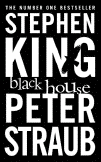 US
US
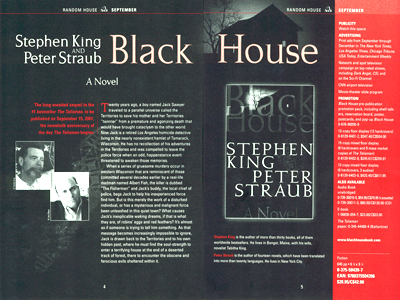 L'affiche publicitaire de l'éditeur Random House
L'affiche publicitaire de l'éditeur Random House


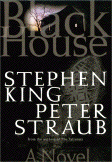 édition US
édition US
|
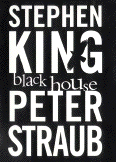 édition UK
édition UK
|
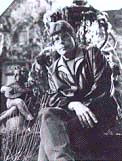 Photo de couverture
Photo de couverture
|
 nouvelle édition
aux USA du Talisman 1
nouvelle édition
aux USA du Talisman 1
|
|


Octobre 2001.
Sortie de Black House en
librairie aux USA.

Le roman Black House possède
désormais son propre site depuis le 7 Août 2001 :
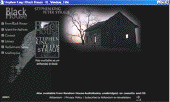 http://www.blackhousebook.com/
http://www.blackhousebook.com/
La version audio (Cassette et CD),
éditée par Simon & Schuster), est lue par Frank
Muller. Durée : 23 heures (pour 27 heures pour The Talisman
).
Juin 2001
La rédaction de
Black House (Talisman 2), actuellement
terminée, a pris plus de temps que prévu.
Conséquences :
1. Les extraits prévus ne
seront publiés sur le web qu'en juin.
2. Le début de la
rédaction du 5è tome de La Tour Sombre
est retardé d'autant et ne commencerait que cet
été.
Le manuscrit a été
remis à l'éditeur.
Nov. 2000.
Le nouveau titre de l'ex-Talisman 2
devient Black
House. Sortie prévue pour Octobre
2001. L'ouvrage devrait être long de 576 pages et sera
publié par Random House.
Une nouvelle, sous format de livre
électronique (probablement disponible uniquement sur
Internet), devrait faire le lien entre les deux ouvrages, à
l'initiative de King.

Concernant ce projet,
Peter Straub
a publié une lettre
où il déclare que le travail a commencé.
"Nous commençons
à rassembler quelques idées de base". Le projet a pris un peu de retard, vient
juste de commencer en ce mois de janvier, et demandera "une année et demie de travail pour
être achevé". Les
choses semblent se mettre bien en place. Le livre a été
vendu à l'éditeur Random House et pourrait être
publié en 2002. Les deux compères sont tout heureux de
ce travail : "He and I are
very excited about this project."
Le roman sera évidemment
consacré à Jack, l'enfant de 12 ans du Talisman, devenu maintenant adulte. Jack Sawyer aurait
maintenant 31 ans et habiterait dans une ferme du Wisconsin
Occidental.
"Notre
intention serait de faire une histoire plus dure et plus sombre que
le premier livre, avec davantage d'horreur et moins de
fantasy", a déclaré Straub dans un communiqué.


|
Voir mon étude :
En marge du Talisman
des Territoires : LA COSMOGONIE DU
TALISMAN.
Le Talisman annonce de nombreux aspects
qui constitueront la conception du monde que King mettra en
place dans le cycle de la Tour Sombre et Insomnie. Au-delà de la quête de Jack/Jason,
le lecteur découvre des mondes multiples (seulement
annoncés dans Le Pistolero) aux
géographies et aux développements
différents, mais qui sont en interdépendance.
L'intérêt se porte ensuite sur le comportement
des humains manipulés par les ordres (Jack est
lié à l'ordre de la Lumière), et des
correspondances sont établies qui rattachent la
quête de Jack aux influences religieuses
méthodistes qui ont imprégné King dans
son jeune âge
|

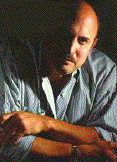
|
 l'auteur : Peter Straub est né
à Milwaukee, dans le Wisconsin, le 2 mars 1943. Il
est l'aîné d'une fratrie de 3 garçons.
Son père était commerçant, sa
mère infirmière. Le père voulait qu'il
devienne un athlète, la mère un docteur ou un
ministre Luthérien. Lui voulait était lire et
apprendre, et il leur fit espérer un métier de
professeur. Études à l'université de
Wisconsin, Colombia University, et au University College de
Dublin. A résidé pendant trois ans en Irlande,
à Dublin (1969-1972) et sept ans en Angleterre
à Londres (1972-1979), puis aux USA dans le
Connecticut, où sa femme Susan était
née. Il habite aujourd'hui New York (3 enfants). Il a
écrit à ce jour 14 romans, 2 recueils de
nouvelles, des nouvelles et de la poésie
(voir sa bibliographie
américaine, et les traductions
françaises). Nombreuses
récompenses littéraires. En particulier,
Mr. X a reçu le Bram Stoker Award. Le plus
littéraire des romanciers de terreur attire à
la fois les amateurs du fantastique et les inconditionnels
du polar. l'auteur : Peter Straub est né
à Milwaukee, dans le Wisconsin, le 2 mars 1943. Il
est l'aîné d'une fratrie de 3 garçons.
Son père était commerçant, sa
mère infirmière. Le père voulait qu'il
devienne un athlète, la mère un docteur ou un
ministre Luthérien. Lui voulait était lire et
apprendre, et il leur fit espérer un métier de
professeur. Études à l'université de
Wisconsin, Colombia University, et au University College de
Dublin. A résidé pendant trois ans en Irlande,
à Dublin (1969-1972) et sept ans en Angleterre
à Londres (1972-1979), puis aux USA dans le
Connecticut, où sa femme Susan était
née. Il habite aujourd'hui New York (3 enfants). Il a
écrit à ce jour 14 romans, 2 recueils de
nouvelles, des nouvelles et de la poésie
(voir sa bibliographie
américaine, et les traductions
françaises). Nombreuses
récompenses littéraires. En particulier,
Mr. X a reçu le Bram Stoker Award. Le plus
littéraire des romanciers de terreur attire à
la fois les amateurs du fantastique et les inconditionnels
du polar.
|
 Voir mes notes de lecture :
Voir mes notes de lecture :
Peter
Straub . Julia 1975, Seghers 1979, Pocket.
Peter
Straub . Ghost story, 1979, Seghers 1979, Pocket.
Peter
Straub . Koko, Laffont 1988, et Pocket.
Rééd. Laffont 2001
Peter Straub . . Mystery, Orban, 1991. Pocket.
Peter Straub . . Sans portes ni fenêtres,
Olivier Orban, 1992.
Peter Straub . . La Gorge, Plon 1995 Pocket 1996
Peter Straub . . Le Club de l'enfer, Plon éd.
1998.
Peter Straub. . . Mr.
X, Plon éd. 2000
Peter Straub. . . Magie de la terreur, 7 nouvelles,
Pocket, 2001

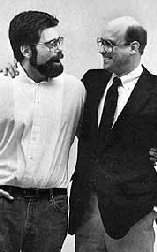 King et Straub à l'époque du Talisman 1
King et Straub à l'époque du Talisman 1
 Historique.
Historique.
(Aug 04) MORE Talisman 2 news! In
an email from Straub to Charnel House today, he confirmed that the
sequel is nearly 200 pages now. There's still no title (but it
definitely will not be Talisman 2), but King and Straub are shooting
for a September 2001 release date. Great news!

(Mar 29, 00) Recently, Peter
Straub was interviewed by Masters of Terror interviewer Jack Madison Haringa.
JMH: Stepping down from the
philosophical plane to the material, we turned our discussion to the
solidity of books. One topic in particular has gotten Straub's fans
excited, the forthcoming sequel to The Talisman, his 1984
collaboration with Stephen King. While Straub had (fairly) recently
said that he and King had moved in different directions to the extent
that they would be unlikely to collaborate again, news to the
contrary appeared late last year on the internet grapevine. What
brought about this change of heart?
PS: "King and I did seem to have
taken different directions, and when people asked if we might ever
collaborate again, I said that I thought it was extremely unlikely. A
couple of things changed my assumptions. In Bag of Bones, King
alluded to both Daphne du Maurier's Rebecca and Melville's 'Bartleby
the Scrivener,' which had fed into my own recent work ["Mr. Clubb and
Mr. Cuff"]-that was kind of startling. It indicated that he and I
were thinking along parallel lines. Then he let me know that he had
been thinking about something I'd said to him years ago, and thought
it could be the focus of a sequel to The Talisman. We wrote back and
forth and discovered that our initial ideas meshed almost magically.
After that, we had no problem deciding to work together again."
JMH: And the premise?
PS: "The book will be a sequel,
but not a continuation. Jack Sawyer is now thirty-one years old,
retired, and living in a farmhouse in western Wisconsin. Darkness
falls. That's all I can say."
(Jan 27, 00) I got an e-mail from
Peter Straub today (that's right! PETER STRAUB!) and he confirmed
that he and King are getting ready to begin The Talisman II. To
quote: "We agreed to a deal with Random House last November, and
since then have been working out some of the basic ideas for the
book."

 Une interview
de Peter Straub.
Masters Of
Terror
Listening to the
Invisible World
A Conversation with Peter Straub
by Jack Madison Haringa
Une interview
de Peter Straub.
Masters Of
Terror
Listening to the
Invisible World
A Conversation with Peter Straub
by Jack Madison Haringa

The first time I met Peter Straub, I gushed like a
fan-boy.
I'm not proud, but I am honest. I barged into a
conversation he was having with poet Linda Addison at a Stoker
weekend and told him I was going to gush unadulterated praise for the
next five minutes, then leave him alone. To his credit, Straub not
only took it with a smile, but actually forgave me enough to chat
again during the weekend. I think I still have the swizzle stick from
the first drink he bought me.
It was, then, an absolute delight to be able to
pick the brain of a writer I admire so much, to ask questions that
went deeper into the working of his fiction than ten minutes at a
convention can get you. In our conversation, Straub leapt from the
practical to the philosophical to the poetic with aplomb, a wry smile
peeking around the edges of every answer.
Peter Straub needs little introduction to any
audience of fiction readers. As a household name in the horror field,
he has become virtually a genre unto himself. He has managed to
garner critical acclaim in several genres that traditionally get no
respect: in suspense with Koko and The Hellfire Club, in mystery with
The Throat, and in horror (the current Rodney Dangerfield of category
fiction) with Ghost Story, Floating Dragon, and his most recent
novel, Mr. X.
Mr. X is a return to the supernatural horror novel
for Straub after the very human terrors of the loosely grouped "Blue
Rose Trilogy" and The Hellfire Club's gleefully wicked Dick Dart. The
new novel has explicit references to H. P. Lovecraft, a paranormally
gifted family at its center, and some of the density of classic
gothic fiction. Does Straub consider this a return to his
roots?
"A trip back to the old neighborhood? Yes, I guess
I do see it that way, although changes in the returnee inevitably
altered his vision of the landscape. I certainly wanted to write an
unambiguous, or maybe I mean straightforward, horror novel again, in
part because I thought it would be pure pleasure to cut loose in that
way, also because I wanted to see what would happen. An earlier
attempt to write a doppelganger novel had taken a different direction
entirely and turned into the book called Mystery, but this time I
thought I could pull it off. Mainstream reviewers always began by
describing my books as horror anyhow, no matter what they were about,
so I was hardly going to startle anybody. And in fact, I had never
lost contact with the horror field and continued to think of myself
as a horror writer, if an idiosyncratic one, one with no interest in
the usual genre-boundaries."
I wondered how he saw the novel differing from his
previous work in horror.
"Sixteen years after the deliberate excesses and
hi-jinks of Floating Dragon, I saw the admission of supernatural
elements into a story less as an invitation to start piling up the
colorful outrages than as an opportunity to violate strict realism
whenever doing so would be useful or entertaining or suggestive. If
the supernatural is let in, the world under consideration does not
always obey the laws of physics or honor the restrictions of rational
order - the universe has widened out to accommodate mystery, not
everything can by known, awe and terror lie close at hand. So I was
free to invoke time travel, ESP, telekinesis, teleportation,
monstrous infants, the decaying remnants of ancient gods, and the
existence of a race descended from those gods."
Straub's characters are often intensely complex
and rarely who they seem to be. This reaches its pinnacle with Mr. X,
in which there is both the idea of the doppelganger and the narrative
doubling of the first person voice, alternating between Ned Dunstan
and the eponymous Mr. X.
"The doppelganger, at least as I used the conceit,
is a literalization of the protagonist's divided impulses, a kind of
metaphor for lost wholeness. His public self, Ned, is kind, rational,
well-mannered, civilized, reflective to the point of passivity; his
split-off self, Robert, is angry, selfish, criminal, impulsive,
childish, wild, cruel. Robert is free to act as Ned cannot dare to
act; Ned both pities and envies Robert; Robert despises Ned and
covets his more settled position in the world; only Ned can admit the
yearning for unity both of them feel.
"With this situation at the center of my story, I
soon came to the idea of having two first-person narrators whose
voices were completely different but whose lives described a kind of
mirror-like counterpoint to one another."
Straub put this in terms of his view on the idea
of personality.
"I guess I resist any monolithic, unilateral view
of the human personality. Actually, I probably reject the notion of
"personality" itself, at least as a unified, intact, consistent and
authentic entity. Almost every human being is more complex and
conflicted than they seem, made up of multiple desires, impulses and
drives, some conscious, some not. The successful neighborhood
contractor who dresses up a clown and visits children's wards on the
weekends turns out to have a dozen teenagers buried beneath his crawl
space; any number of settled, stable, authoritative English
politicians have spent their free hours in rooms where they wear
diapers and wallow in the abuse delivered by whores in nurses'
uniforms; the clerk at the hardware store conceals a streak of
vibrant, life-sustaining mysticism; secret lives abound, though in
most cases less extravagantly."
There is a second philosophy that exists as an
undercurrent to Mr. X, and to many of Straub's other novels: the idea
of the hidden or invisible world. In Mystery, the author mentions a
world of perfect clarity beneath this one; in The Throat it is a
sound under the earth like giant machinery when everything else has
gone quiet. I asked him what he believed this machinery was, and
whether he saw the world in this bifurcated fashion.
"The sound from the depths of the earth can be
heard only by people like Scoot, Ratman, and their compatriots of the
Body Squad [in The Throat], who have been transformed by prolonged
exposure to extremities of fear and violence and therefore perceive
ordinary reality in an unconventional and heightened way impossible
to attain by those who have not had the privilege of such exposure.
The machinery is that of a great constant attentiveness. If you can
hear it, it hears you. A kind of instinctive Platonism lies behind
this image.
"In The Throat, a professor of Religion named Alan
Brookner simultaneously acknowledges and dismisses unverifiable
metaphysical systems by saying '[T]here is another world, and it's
this world.' That is, the true nature of things is located within the
things themselves, not in some invisible superior realm. What we see
are shadows of essential Being, but we see shadows because we see
imperfectly. At those times when,
through one mechanism or another, our lenses are
washed clean, we discover what has been before us all along, a world
in which every detail, every particle overflows with Being. Garden
hoses, new-mown lawns, kitchen knives, toasters, sand dunes, oak
trees, beetles, tiger lilies, the mailman's cart - everything the eye
takes in, animate and inanimate alike, brims with living essence,
meaning, profound significance. For a moment, maybe for as long as
ten or fifteen minutes, you are looking at reality, and you know it.
Its beauty is overwhelming, all but unbearable.
You seem to be floating an inch or two above the
ground, blazing. Then it's over, everything has returned to its
normal state, and the garden hoses and tiger lilies are again just
hoses and weeds.
"The chapter on Mysticism in William James's
Varieties of Religious Experience describes several first-hand
experiences of precisely this kind. Because James's subjects were all
believing Christians, they immediately framed their experiences in
religious terms. One can't blame them for responding in this way, for
they had apprehended the sacred. However, the sacred has no necessary
connection to the Christian narrative of redemption and salvation.
Nor does the "mystical" experience. Certain great painters have
represented the facts of the case by the simplest and most unmediated
of methods, still lifes and landscapes. Look at the undersides of
wind-blown leaves in Corot, shimmering gray-green amidst darker green
above a pond where cows graze; above all, look at Cézanne's
still life paintings of bowls of apples and coffee cups arrayed on a
table-top. These mundane objects burn off the surface of the canvas,
they are irradiated with Being, the sacred speaks through them. And
if you want to know how it felt to be an extraordinarily receptive
and responsive viewer who was standing in front of these paintings
when they were first exhibited as a group, take a look at the letters
Rilke wrote stunned and reeling to his wife, collected as On
Cézanne."
But Straub's sense of this mystical, "more real"
reality is not limited to the abstract.
"My own experiences of this kind, granted
repeatedly during childhood, then forgotten and withheld for decades,
then delivered to their grateful recipient at a rate of one every
fifteen to twenty years, inform, I suppose, everything I've written.
Certain paragraphs in Koko, Mystery, The Throat and the story "The
Buffalo Hunter" refer to them directly. The novella called "Hunger:
An Introduction" takes this experience as its central concern. My
character is suddenly blessed with an apprehension of another world,
the real world, and it is this one."
Stepping down from the philosophical plane to the
material, we turned our discussion to the solidity of books. One
topic in particular has gotten Straub's fans excited, the forthcoming
sequel to The Talisman, his 1984 collaboration with Stephen King.
While Straub had (fairly) recently said that he and King had moved in
different directions to the extent that they would be unlikely to
collaborate again, news to the contrary appeared late last year on
the internet grapevine. What brought about this change of
heart?
"King and I did seem to have taken different
directions, and when people asked if we might ever collaborate again,
I said that I thought it was extremely unlikely. A couple of things
changed my assumptions. In Bag of Bones, King alluded to both Daphne
du Maurier's Rebecca and Melville's 'Bartleby the Scrivener,' which
had fed into my own recent work ["Mr. Clubb and Mr. Cuff"]-that was
kind of startling. It indicated that he and I were thinking along
parallel lines. Then he let me know that he had been thinking about
something I'd said to him years ago, and thought it could be the
focus of a sequel to The Talisman. We wrote back and forth and
discovered that our initial ideas meshed almost magically. After
that, we had no problem deciding to work together again."
And the premise?
"The book will be a sequel, but not a
continuation. Jack Sawyer is now thirty-one years old, retired, and
living in a farmhouse in western Wisconsin. Darkness falls. That's
all I can say."
This will make two supernatural horror novels in a
row for Straub, despite mainstream publishers' aversion to the
h-word. A collection of short fiction, Magic Terror, is due from
Random House this summer and contains at least a few stories firmly
in the horror tradition. As a former trustee of the Horror Writers'
Association, however, he expressed himself volubly on horror's
demise.
"Horror, the living corpse; horror, the uninvited
guest peering through the window; horror, the patient in the ICU.
Doctors scratch their heads and move in the direction of more
promising cases, like that twenty-five-year-old beauty in cubicle 5 -
man, talk about your full-bleed, color jacket photos, this kid's a
natural! - who has written a memoir in the form of a novel, or maybe
it was a novel in form of a memoir, about, what was it again, getting
off drugs and making it big in the high-pressure world of fashion
industry gossip, or getting into drugs and sleeping with about a
million no-good guys while making it big in the movie business?,
well, one of those anyhow, who cares, we can get her on Letterman for
sure.
"I'm very much of two minds about this. The world
of publishing, our context, has changed almost beyond recognition
since I first knocked on the door. Everything is harder, colder,
crueler, much less literary. The kind of writers now referred to as
'mid-list,' formerly the backbone of the industry and supported
through book after book, scuffle to get published at all, while
editors desperate to keep their jobs chase after famous athletes,
movie stars, dimwits in popular television programs, celebrity
defendants and their legal representatives, plus people like that
little darling in cubicle 5, who come armed with photogenic mugs,
sensational undemanding products, and no track record. By and large,
it isn't about writing any more, it's about marketing-just look at
the New York Times.
"On the other hand, horror in general, 'horror,'
has been chewing its own legs off for years. It's kind of stupefying.
I'm stupefied, anyhow. It ought to be transparently clear that horror
fiction finds its validity in the expression of originality and
powerful emotion, in its readiness for risk, transgression, and
honesty, and in its narrative pressure. Horror is supposed to be
urgent, involving, suggestive; it's supposed to give you what you
can't get anywhere else, a representation of what is otherwise
repressed or denied. My stupefaction resulted from the discovery that
many, many otherwise hard-working writers reflexively assumed
themselves worthy of recognition on the basis of formulaic, basically
thoughtless work, simply because what they wrote was horror. This
point of view numbs and depresses me - it places us in the third
grade, in a cultish never-never land utterly unconnected to the
larger, wider world.
"Good writers will always come along and find
their way: witness Mike Marano and Graham Joyce."
This comment brought us 'round to the subject of
reading in general. "What," I asked, "does Peter Straub read?"
"The person known as Peter Straub falls into the
wider category of persons who, when closely observed, tend to be seen
carrying books in their hands no matter where they are, inside their
living quarters or outside, wandering around through the traffic.
When asked what they read, persons of this type respond with either,
'What you got?' or 'I'm an omnivore.' As an omnivore, I read
everything that attracts my attention.
"Here's a partial list of what I have read or been
reading over the last six months: recent biographies of Ross
Macdonald, Malcolm Lowry, and Wallace Stegner; a book about the
Partisan Review circle; new books of poetry by John Ashbery, Bruce
Andrews and Mei-Mei Bersenbrugge; new crime novels by Michael
Connelly, Jonathan Kellerman, Ed McBain, Elizabeth George and some
others; Simon Schama's book about Rembrandt; a book about Nabokov's
Pale Fire by Brian Boyd; Henry James's letters; a collection of
essays about movie actors edited by Luc Sante; a book about Albert
Fish; two unclassifiabilities by Neil Gaiman; two, maybe even three,
new Stephen Kings; at least half a dozen novels that vanished from
memory as soon as I finished them; an extremely interesting book
called Jesus of Nazareth, King of the Jews, by the great Biblical
scholar Paula Fredericksen; and a lot of other stuff as welI noted
mention of King and Gaiman in there, but wondered what other horror
writers interested him.
"I'm not as in touch as I should be with the work
of newer horror writers, in part because too much work that didn't
really appeal to me came out after the mid-eighties, and I couldn't
keep up with it all. Some of the new arrivals were operating far out
of the field of my concerns and interests, at least from what I
gathered by reading reviews and hearing people talk about them, so I
wished them well and gave them a pass.
"Apart from Marano and Joyce, whose writing
impressed me immediately, I like Douglas Clegg, a very talented
writer who understands exactly what he is doing, and the short story
writer Kelly Link, who might be the most promising writer to come
along in years."
In other interviews, Straub has said that he read
voraciously as a child, and the habit seems to have stayed with him.
H. P. Lovecraft was clearly an influence on Mr. X and Raymond
Chandler's The Long Goodbye is acknowledged in The Throat, but what
other writers have influenced Straub, either stylistically or
thematically?
"I've been influenced by so many people that it's
hard to pin them all down. Ross Macdonald, Faulkner, Ford Madox Ford,
Iris Murdoch and Henry James connected to the themes that most spoke
to me; Nabokov, Chandler, James, E. B. White, Joseph Mitchell, John
Updike, all affected my style, as did John Irving's A Prayer For Owen
Meany. A great novel by the vastly undercelebrated Donald Harington
called Some Other Place. The Right Place. had an enormous impact on
me, as did a couple of his other books."
Hackneyed as it may be, I asked my very patient
guest to finish up with some advice for the aspiring writer. Despite
the fact that he must get asked this question at least a dozen times
a year, he didn't offer a pat answer.
"It's hard to know what to say - I used to be 'an
aspiring writer,' a position I remember very vividly, and part of my
awkwardness is the absolute awareness that I would have dismissed or
ignored most of the advice dispensed by an old bluffer like the
present me. How could guys like that have anything to tell me, I
thought, they've already got it made, they're sitting pretty. What
went through my mind as I watched them perform was How did they
manage to get that way, anyhow? That was the real mystery, how these
middle-aged-to-elderly writers had negotiated the transition from
ambitious youth and rejected manuscripts to achievement and
recognition. Like all infant writers, I wanted to skip over the
middle passage and proceed directly to recognition and a living
wage.
"The conventional advice given to beginning
writers and people who think they want to be writers consists of
variations on the theme, Keep writing. A slightly more advanced form
of this recommendation is, Keep writing no matter what anyone says to
you or how much discouragement you get. It's great advice, even
though someone who really is going to get there doesn't need it, but
I've never heard anyone say, You have to write and write and write,
you have to keep on writing, in order to make all the mistakes you
can and create about a ton of garbage before you can even begin to
discover what you're good at.
Impatience and arrogance must be burned away
through the exercise of unremitting, selfless labor. No one wants to
hear it, but that's the deal, that's how it works. You have to write
your mountain of failed gestures and weak imitations of other
writers' effects, endure uncertainty and despair, and be stubborn
enough to keep going until finally something emerges that contains a
sliver of your own voice. After that, things do not get much better,
for one has now entered the painful mystery known as 'process,' ha, I
love hearing people croon about 'process,' but they get a little
better, at least, as the ongoing struggle takes on more interesting,
more fulfilling dimensions. After all, this job was never supposed to
be easy. If it were, everybody would be doing it."
The author : While unused to speaking about
himself in the third person, Jack Madison Haringa didn't feel
comfortable asking anyone else to list his qualifictions. He is
pursuing his Master of Arts in English Literature at Clark University
in Worcester, MA, where he lives with his wife. He is a member of the
Horror Writers' Association, the HorrorNet Cabal, and the
International Association for the Fantastic in the Arts. He has
written a great deal of fiction which remains suspiciously
unpublished.
Tous mes remerciements à Masters
of Terror,
http://pluto.spaceports.com/~mot/index.html

 Contenu de ce site Stephen King
et littératures de l'imaginaire :
Contenu de ce site Stephen King
et littératures de l'imaginaire :

 .. du site
Imaginaire
.. du site
Imaginaire
 ..
du site Stephen King
..
du site Stephen King
 ..
.
..
.